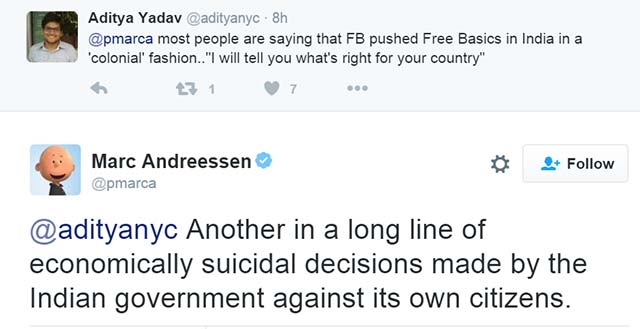-
Tips for becoming a good boxer - November 6, 2020
-
7 expert tips for making your hens night a memorable one - November 6, 2020
-
5 reasons to host your Christmas party on a cruise boat - November 6, 2020
-
What to do when you’re charged with a crime - November 6, 2020
-
Should you get one or multiple dogs? Here’s all you need to know - November 3, 2020
-
A Guide: How to Build Your Very Own Magic Mirror - February 14, 2019
-
Our Top Inspirational Baseball Stars - November 24, 2018
-
Five Tech Tools That Will Help You Turn Your Blog into a Business - November 24, 2018
-
How to Indulge on Vacation without Expanding Your Waist - November 9, 2018
-
5 Strategies for Businesses to Appeal to Today’s Increasingly Mobile-Crazed Customers - November 9, 2018
Facebook Director Andreessen Sorry For India Internet Remarks
Facebook founder Mark Zuckerberg has publicly distanced himself from comments made by a board member yesterday which appeared to suggest support for colonialism in India.
Advertisement
Responding to the tweets, Zuckerberg said they were “deeply upsetting” in a post on Facebook, claiming they don’t represent his company’s, or his, views at all. He added that “Facebook has always stood for connecting people across the world but we need to understand the past of a country before shaping the future”.
What’s particularly tough about Andreessen’s comments is that many Free Basics opponents believe that Facebook’s free Internet plan will stifle Indian innovation by promoting established, existing services instead of allowing local Indian services to grow.
Critics of Free Basics argued that by limiting which sites users could visit, Facebook was going against the principle that all internet users should be treated the same by service providers.
“I apologize for any offense my remark prompted, and withdraw it in full and with out reservation”, he wrote.
But the controversy didn’t stop there as Andreessen has replied to a message comparing the social media’s Free Basics to internet colonialism.
However, Twiterrati were quick to point out the similarity between the Free Basics and East India Company which entered India on the pretext of doing trade and eventually ended up colonising and ruling India for 200 years. “But to shape the future we need to understand the past”.
His comments came after Andreessen made a objectionable tweet after the Telecom Regulatory Authority of India (TRAI) ruled against Facebook’s free but restricted internet programme. Writing on Twitter (another one of his many investments) the venture capitalist said that denying the “world’s poorest” people “free partial Internet connectivity when today they have none, for ideological reasons, strikes me as morally wrong”. “I will depart all future commentary on all of those subjects to individuals with extra information and expertise than me”.
“And for the record, I am opposed to colonialism, in any country”.
Advertisement
A motorist rides past a billboard displaying Facebook’s Free Basics initiative in Mumbai, India, Dec. 30, 2015. CEO Mark Zuckerberg has said that the company “is still committed” to connecting Indians online. Mr. Zuckerberg said that an early trip to India helped solidify his vision for Facebook and he was inspired by the country’s progress.




























